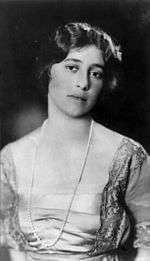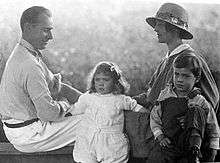Mary Harriman Rumsey
| Mary Harriman Rumsey | |
|---|---|
 | |
| Born |
Mary Harriman November 17, 1881 New York City, United States |
| Died |
December 18, 1934 (aged 53) Washington, D.C., United States |
| Cause of death | Horseback riding accident |
| Resting place | St. John's Church Cemetery, Arden, New York |
| Residence | Wheatley Hills, Long Island, New York, Middleburg, Virginia |
| Education | Barnard College |
| Occupation | Chair of the Consumer Advisory Board, National Recovery Administration |
| Political party | Democratic |
| Religion | Episcopalian |
| Spouse(s) | Charles Cary Rumsey |
| Children | 3 |
| Parent(s) |
E.H. Harriman Mary Averell |
| Relatives |
W. Averell Harriman (brother) E. Roland Harriman (brother) |
Mary Harriman Rumsey (November 17, 1881 – December 18, 1934) was the founder of The Junior League for the Promotion of Settlement Movements, later known as the Junior League of the City of New York of the Association of Junior Leagues International Inc. Mary was the daughter of railroad magnate E.H. Harriman and sister to W. Averell Harriman, former New York State Governor and United States Diplomat. In 2015 she was posthumously inducted into the National Women's Hall of Fame.[1]
Early life
Mary Harriman Rumsey was born on November 17, 1881, the oldest of six children of railroad industrialist E.H. Harriman (1848–1909) and his wife, Mary Averell Harriman (1851–1932).[2]
- Mary Harriman (1881-1934)
- Henry Neilson Harriman (1883-1888)
- Cornelia Harriman (1884-1966), who married Robert Livingston Gerry (1877-1957)[3]
- Carol Averell Harriman (1889-1948), who married R. Penn Smith in 1917. After his death in 1929, she married W. Plunket Stewart, a racing stable owner in 1930[4][5]
- William Averell Harriman (1891-1986), who in 1955 became the Governor of New York. He married Kitty Lanier Lawrence,[6] then Marie Norton Whitney (1903–1970), and lastly to Pamela Beryl Digby Churchill Hayward (1920–1997)
- Edward Roland Noel Harriman (1895-1978), who married Gladys Fries (1896–1983)
Mary attended Barnard College, where she specialized in sociology and was a member of Kappa Kappa Gamma.
Career
The Junior League

Inspired by a lecture on the settlement movement, Mary, along with several friends, began volunteering at the College Settlement on Rivington Street in New York City's Lower East Side, a large immigrant enclave. Through her work at the College Settlement, Mary became convinced that there was more she could do to help others. Subsequently, Mary and a group of 80 debutantes established the Junior League for the Promotion of Settlement Movements in 1901, while she was still a student at Barnard College. The purpose of the Junior League would be to unite interested debutantes in joining the Settlement Movement in New York City.
Realizing their lack of experience in dealing with the issues that faced people seeking help at the settlement house, Mary and League leaders brought together experts on the Settlement Movement to provide lectures and instruction to Junior League members. With better preparation came greater engagement leading to increased interest in membership by women notable in New York society; members would come to include Eleanor Roosevelt, Dorothy Whitney Straight and Ruth Draper.
As word of the work of the young Junior League women in New York spread, women throughout the country and beyond formed Junior Leagues in their communities. In time, Leagues would expand their efforts beyond settlement house work to respond to the social, health and educational issues of their respective communities. In 1921, approximately 30 Leagues banded together to form the Association of Junior Leagues of America to provide support to one another. With the creation of the Association, it was Mary that insisted that although it was important for all Leagues to learn from one another and share best practices, each League was ultimately beholden to its respective community and should thus function to serve that community’s needs.
As the 20th century progressed, more Junior Leagues were formed throughout the United States, Canada, Mexico and the United Kingdom. Now known as the Association of Junior Leagues International Inc. (AJLI), the organization encompasses 292 member Leagues, with over 160,000 members committed to continuing the legacy established by its founder.
Consumer Advisory Board
In 1933, President Franklin D. Roosevelt appointed Mary to chair the Consumer Advisory Board (CAB) of the National Recovery Administration (NRA), the first government consumer rights group.[2]
Despite her inexperience, Mary's work with farming cooperatives and belief in the power of cooperation would come to be her greatest assets. Mary would promote the formation of consumer groups across the nation and encourage these groups to report their grievances to her office.
Mary Rumsey's legacy to New Deal reforms would be continued by her younger brother, W. Averell Harriman. Averell was encouraged by his older sister to leave his finance job and join her and their friends, the Roosevelts, to advance the goals of the New Deal. Averell joined the NRA, marking the beginning of his political career.
Personal life
In 1910, Mary married sculptor and polo player Charles Cary Rumsey (1879–1922), shortly after the death of her father on September 9, 1909. Rumsey had been working at Arden House, creating one of the principal fireplace surrounds, as well as other decorative sculpture. Together they had a daughter and two sons.
- Charles Harriman Rumsey (1911-2007)
- Mary Averell Rumsey (b. 1913), who made her debut in 1932 at a party with over 1,100 guests.[7]
- Bronson Harriman Rumsey (1917-1939), who died when the plane he was riding in, along with Daniel S. Roosevelt (1917-1939) (the son of Hall Roosevelt and nephew of Eleanor Roosevelt), hit a mountain slope near Guadalupe Victoria, Puebla, Mexico.[8]
Charles was killed in a car accident in 1922.[9] Mary died in 1934 as a result of a horse riding accident which occurred while on a hunt near Middleburg, Virginia.[10]
References
- ↑ October 3, 2015. "10 women honored at Hall of Fame induction". Democratandchronicle.com. Retrieved 2015-10-04.
- 1 2 McHenry, Robert (1980). Famous American Women: A Biographical Dictionary from Colonial Times to the Present. New York: Dover. p. 359. ISBN 0-486-24523-3.
- ↑ LaFever, Ray. "Robert Livingston Gerry". findagrave.com. Find A Grave Memorial. Retrieved 7 April 2016.
- ↑ "Mrs. Stewart to Sell Colts". timesmachine.nytimes.com. The New York Times. June 15, 1940. Retrieved 19 April 2016.
- ↑ "MRS. C.A.H. SMITH WEDS W.P. STEWART; Daughter of Mrs. E. Henry Harriman Is Married to Philadelphian at Her Country Home. WEDDING GIVES SURPRISE No Announcement Had Been Made of Betrothal of Widow of R. Penn Smith and Banker. Kin of Judge William Averell.". timesmachine.nytimes.com. The New York Times. September 18, 1930. Retrieved 19 April 2016.
- ↑ Kathleen Mortimer, Rich and Adventurous, Dies at 93
- ↑ "1,000 AT BALL GIVEN FOR MARY RUMSEY; Guests Invited to Come to Debutante Party on Long Island in Overalls. EVENT LIKE A BARN DANCE Decorations Are Cornstalks and Vegetables -- Ham and Eggs and Apple Sauce for Supper.". timesmachine.nytimes.com. The New York Times. September 17, 1932. Retrieved 19 April 2016.
- ↑ "AIR VICTIMS' BODIES HERE; Plane Serves as Hearse for Roosevelt and Rumsey". timesmachine.nytimes.com. The New York Times. April 22, 1939. Retrieved 19 April 2016.
- ↑ September 22, 1922 New York Times article titled "CHARLES C. RUMSEY DIES IN AUTO CRASH ON JERICHO TURNPIKE"
- ↑ NYTimes: Rumsey Children to Share Estate
Additional sources
- Nancy Beth Jackson, Ph. D. . The Junior League: 100 Years of Service. FRP. 2001.
- Janet Gordon & Diana Reische. The Volunteer Powerhouse. Rutledge Press. 1982.
- Association of Junior Leagues International: Legacy
- Association of Junior Leagues International: Notable Members
- Barnard Archives and Special Collections: Mary Harriman Rumsey 1905.
External links
 Media related to Mary Harriman Rumsey at Wikimedia Commons
Media related to Mary Harriman Rumsey at Wikimedia Commons